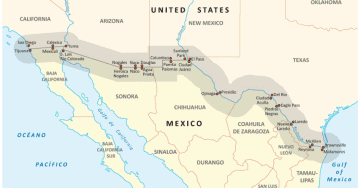
Our friends at Common Sense Media have written some guidelines to help families talk about border separations, which are a great starting point. We’ve added some questions and talking points that can help you get the conversation started at your dinner table tonight.
Talking About What Your Family is Hearing
Common Sense Media recommends:
Talking and listening to find out what your family knows and how they feel about what they’re seeing and hearing.
We suggest that you ask:
- Have you heard about kids and parents getting separated when they come to the border? What have you heard?
- Where have you gotten your information about border separations? From the TV, internet, friends, teachers, family?
- Do you have questions about what you’ve seen and heard?
- How are you feeling about what you’ve heard? Is there anything you want to talk about? I know I have been feeling __________.
Talking About Respect for Others
Common Sense Media recommends:
Reinforcing empathy, acceptance and respect through talking about tolerance and sharing books about the immigrant experience.
We suggest that you talk about how people are alike and different, and how we can learn from and respect everyone. Try these conversation starters to help get the ball rolling.
Talking About Your Family and Community
Common Sense Media recommends:
Looking at your own family and friends to find stories of immigration you can share.
We suggest:
- Talking about your family’s origins. Where did your ancestors come from? If they emigrated elsewhere, why did they choose to leave their homes?
- Asking kids to share their knowledge of family history with you. What is the earliest story they know about an ancestor? If your family originated somewhere else, what do they know about their family’s entrance to the United States, or their journeys?
- Talking about friends, neighbors and community members who are from other countries. Where do they come from? How do you think they felt when they left their homes to start a new life in a strange place? What have we and our community gained from having them here?
- Playing some family history games to help reinforce kids’ understanding of their own ancestry. Try making a family tree together, or playing “Which One…?”
Talking About News Sources
Common Sense Media recommends:
Thinking about news sources and differing points of view.
We’d add that you can have a conversation about fact-checking and paying attention to sources:
- How do you decide whether to trust a news source or not? Are there clues you look for?
- If you’re not sure whether something is true or not, how can you find out? Do you know who to ask or where to look for credible information?
- Do you think it’s okay to share information with others — online or in person — if you’re not sure whether or not it’s true?
- What’s the difference between a fact and an opinion? Can you give an example of something you believe to be a fact about border separations, and an example of an opinion about the topic?
Talking About Online Responsibility and Respect
Common Sense Media recommends:
Being mindful of how you use social media, and trying to model caring and respect, no matter how strongly you might feel about this issue.
We suggest:
Having a conversation about respectful social media use. We’ve written about social media extensively before, and recommend checking out these conversations for parents and kids about online responsibility.
- Class of 2023, or No Class at All? About the consequences of using offensive language online.
- To Tweet or Not to Tweet? About using social media to talk about sensitive personal topics, and the boundaries between privacy and connection.
- The Selfie and the Sacred, about whether it’s disrespectful to post certain images and ideas on social media.
Talking About History and Tolerance
Common Sense Media recommends:
Fighting stereotypes and talking about history.
We suggest:
- These conversation starters about immigration and the meaning of the word “home.”
- This collection of conversations about civil rights, justice, and important historical figures.
- This conversation about how to respectfully engage with difficult historical topics.
There is no single “right way” to talk about what’s happening in our world, or to help kids understand difficult moments in history. But above all, we encourage families to keep talking about things that matter, both at dinner and at every other opportunity.